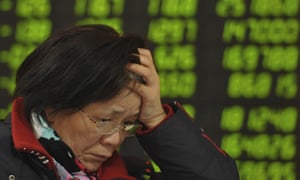Business leaders and policymakers at the World Economic Forum will focus on Chinese downturn, a commodities rout and stock market turmoil
Katie Allen, Sunday 17 January 2016
The fragility of the global economy will take centre-stage this week with the International Monetary Fund poised to warn of growing economic risks as business leaders and policymakers gather for the annual World Economic Forum in Davos.
The IMF will update its forecasts for global growth on Tuesday and is widely expected to paint a bleaker picture for the year ahead amid the deepening Chinese downturn, a commodities rout and turmoil on global stock markets.
Investors are also awaiting the first speech of the new year from the Bank of England governor, Mark Carney, and hoping for assurances that interest rates will stay at their record low for many months given the shaky global backdrop, a slowdown in the UK economy and low inflation.
The official theme of this year’s Davos meeting is “the fourth industrial revolution”, or the looming impact of robots and artificial intelligence. But central bankers, ministers and business bosses meeting in the Swiss ski resort will doubtless be distracted by the torrid start to the year on financial markets that has so far seen almost $4tn (£2.81tn) wiped off global shares in the worst opening weeks on record.
Even before the global rout, IMF head Christine Lagarde had warned that the slowdown in China, the world’s second-biggest economy, and the prospect ofrising interest rates in the US were feeding uncertainty and denting growth prospects for 2016. The IMF is expected to use Tuesday’s update to its World Economic Outlook to underscore that message and cut its global GDP forecasts.
China will add to the global gloom with GDP figures on Tuesday expected to show the weakest full-year growth for quarter of a century, at 6.9%. Further confirmation of China’s slowdown will heighten worries over the futility of a series of moves by Beijing to shore up growth and investor confidence.
China-related fears have battered stock markets from the US to Asia while in the UK, the FTSE 100 has lost 7% since the start of 2016. Globally, stock markets have shed $3.83tn in value since the start of the year, according to S&P Dow Jones Indices.
In the UK, a raft of economic figures are likely to underline the uncertain outlook, including fresh confirmation that Britain’s pay recovery has stalled. Earnings growth, excluding bonuses, is expected to dip to 1.8% in the three months to November compared with 2% in the three months to October, according to a Reuters poll of economists.
After years of pay undershooting inflation and so falling in real terms, British wages rebounded last year. But pay rises have faltered in recent months and workers should brace for pay growth to remain weak, warns the think tank the Resolution Foundation. Leaving interest rates at the record low of 0.5% last week, the Bank noted signs that wage growth had dipped. Policymakers also said the latest sharp fall in oil prices, which hit fresh 12-year lows last week, would probably keep inflation lower than they had been expecting.
Economists forecast official figures on Tuesday will show inflation edged up to 0.2% in December from zero the month before. Inflation has been below the Bank’s 2% target for almost two years and is expected to stay low thanks to a supermarket price war and low oil prices. Brent crude prices fell below $30 a barrel last week.
The growth outlook for the UK has also been clouded by news of a recession in the manufacturing sector and uncertainty over the outcome of a referendum on Britain’s EU membership, promised before the end of 2017 but expected to take place this year.
In recent weeks, financial markets and economists have pushed back their expectations for an interest rate rise to the second half of this year at the earliest. Last July, Carney had appeared to warn households to prepare for a rate rise in early 2016 when he said the decision on when to increase borrowing costs would “likely come into sharper relief around the turn of this year”.
Mortgage holders and investors will be hoping for a fresh update from Carney in Tuesday’s speech although the Bank governor may want to avoid providing any clear hints having been forced to row back on such guidance in the past.

No comments:
Post a Comment